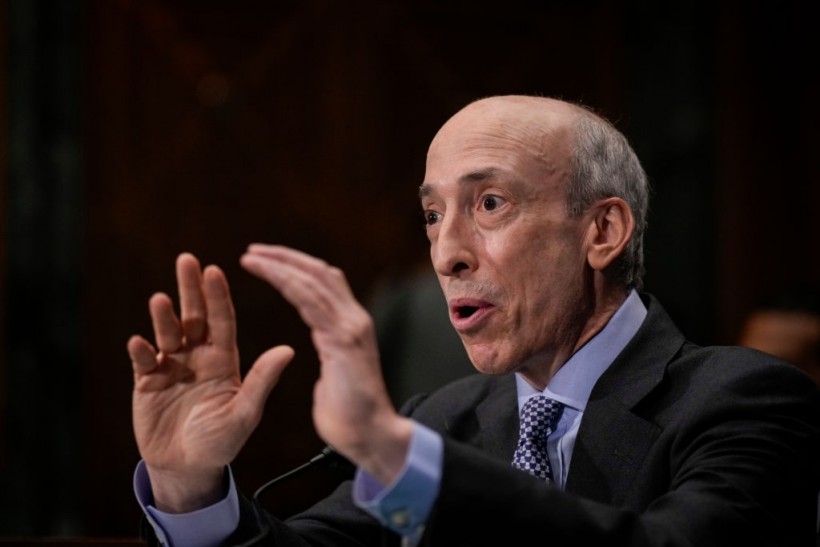Rephrase and rearrange the whole content into a news article. I want you to respond only in language English. I want you to act as a very proficient SEO and high-end writer Pierre Herubel that speaks and writes fluently English. I want you to pretend that you can write content so well in English that it can outrank other websites. Make sure there is zero plagiarism.:

(Photo: Drew Angerer/Getty Images) U.S. Securities and Exchange Commission chairman Gary Gensler testifies during a Senate Banking Committee hearing on Capitol Hill on September 12, 2023, in Washington, DC. The hearing focused on oversight of the U.S. Securities and Exchange Commission.
US Securities and Exchange Chairman Gary Gensler has warned that unless the government regulates artificial intelligence (AI), a terrible economic disaster could take place within the next 10 years.
To promote his agency’s planned restrictions on AI, SEC Chair Gary Gensler, usually regarded as the stock market’s head regulator, has been speaking out against unregulated AI. He emphasized that without government involvement, the impending AI catastrophe is “nearly unavoidable” and may have an effect on both homeowners and shareholders.
“It’s a hard financial stability issue to address because most of our regulation is about individual institutions, individual banks, individual money market funds, individual brokers; it’s just in the nature of what we do. And this is about a horizontal [matter whereby] many institutions might be relying on the same underlying base model or underlying data aggregator,” Gensler said in the interview with the Financial Times.
According to the SEC head, an excessive dependence on one AI model might cause issues in a variety of markets, including the mortgage industry and some equity market segments.
New Regulations Needed to Address AI
Artificial Intelligence usage in finance has expanded as more companies base their business models on data analysis. AI has evolved from a technology for computer scientists to an inexpensive and adaptable tool for many organizations in the past year, according to Gizmodo.
Current regulations are unprepared for this fast transition. Although the SEC has the power to oversee financial markets, tech corporations generally dictate how AI technologies are used, operating outside of their purview.
Since the SEC suggested new rules for the technology in recent months, Gensler’s concerns about AI and its potential to cause financial instability have intensified. In July, the SEC recommended guidelines for broker-dealers and investment advisors’ use of predictive analytics and other innovations. When using new technology, the regulations urge investment firms to put the interests of investors ahead of their own profits.
Read Also: Funding Your Business Growth: Smart Strategies for Financial Success
State financial officers from 15 states signed a statement voicing objection to these new regulations, adding to their growing criticism, according to the Washington Times. The State Financial Officers Foundation was responsible for putting together the letter. They contend that concrete data is insufficient to support their fears and that the SEC’s proposed restrictions would be expensive and inhibit the use of new technologies.
Governments Are Struggling
Calls for more regulation have been made in response to Gensler’s gloomy prediction of AI’s contribution to upcoming financial crises. Regulators worldwide are struggling to regulate AI, but the EU has drafted comprehensive AI legislation. On the other hand, the United States is evaluating technology to determine which components require new restrictions and which are already subject to existing laws.
Wall Street already uses AI in several ways, including robo-advisors, account opening procedures, and brokerage applications. Washington legislators and regulators are concentrating on AI market stability, data privacy, and antitrust issues amid growing scrutiny.
In July, the FTC began reviewing ChatGPT producer OpenAI for consumer damage and data security vulnerabilities, while antitrust regulators have voiced concerns about AI’s structural dependency on scale and ability to enable tech monopolies.
Related Article: LinkedIn Implements Workforce Reduction, Focusing on Future AI Priorities

ⓒ 2023 TECHTIMES.com All rights reserved. Do not reproduce without permission.

I have over 10 years of experience in the cryptocurrency industry and I have been on the list of the top authors on LinkedIn for the past 5 years. I have a wealth of knowledge to share with my readers, and my goal is to help them navigate the ever-changing world of cryptocurrencies.




